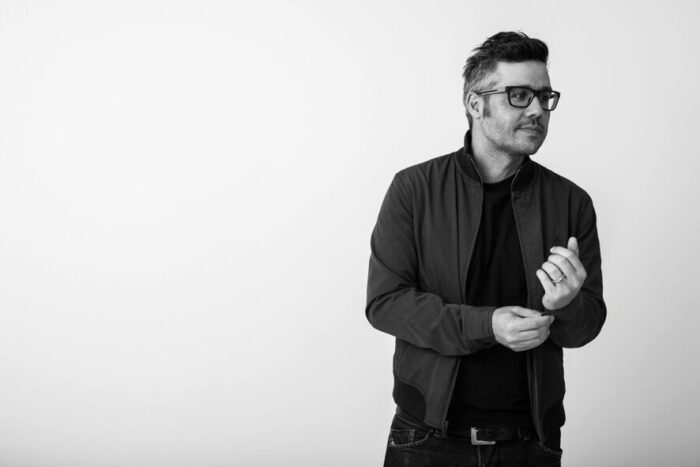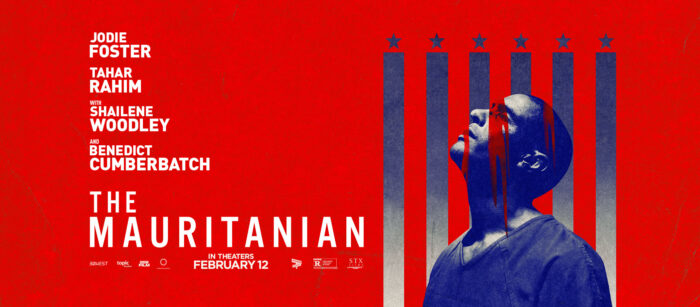By Vicky Bennett / GMS Administrator


This month, we are excited to bring back our ‘Composer Corner‘!
We had the absolute pleasure to speak with Tom Hodge to understand his work on the score behind The Mauritanian.
The Mauritanian delves into the true story of Mohamedou Ould Salahi, a suspected 9/11 terrorist who is imprisoned at Guantanamo Bay, Cuba, for six years by a defense attorney, her associate and a military prosecutor.
Tom tells us his role, process, challenges and highlights that came with his work and even gives us a sneak peek into what he is currently working on.
- Vicky: How did you come to be involved with The Mauritanian and what was it that drew you towards working on the film?
Tom:
The way any composer hopes it might happen really! My agent called and said, “We have a project you might be interested in!…” I then spoke to Kevin on the telephone, did some fairly detailed concept demos and we were into it not long after! Very different to the usually long drawn out process really…
And as to what drew me to it? Well it’s a Kevin Macdonald movie with Jodie Foster, Benedict Cumberbatch and Tahar Rahim in the lead roles! It was a wonderful opportunity to be a part of something special.
- What was your preparation process for scoring the film & were there any challenges involved going forward?
Tom:
Time was tight. Almost a full hour of the score had to completed, recorded and mixed in 5.1, in six weeks, and there was really only about a week between knowing about the project and being on the project!
So the preparation process was somewhat curtailed.
What made it flow actually was realising that Kevin was looking for strong themes to attach to his central characters. Looking back now, I think without this, the deadline would have been pretty perilous!
But as a result, we were able to really focus on finding music that felt like it was landing just right in certain key scenes and then roll it out throughout the narrative. It was a surprisingly ‘classic’ approach really. (As composers, we probably spend as much of our time avoiding leitmotifs now, as we do writing them!)
For Mohamedou’s theme, I sat at the piano late at night on ‘day one’ searching for a melodic/harmonic answer that I felt would be robust enough to cope with the extraordinary journey he was going on.
- How did you interpret what the director, Kevin Macdonald, wanted from a scene?
Tom:
We talked a lot actually! He came to the studio two or three times a week- as luck would have it, we live quite close. That was incredibly helpful.
I was lucky that the edit was done, completely locked. Time with the director is so often hard to come by and it’s certainly easier to read the emotional temperature of the scene when you are in the same room!
I spoke with Kevin’s editor Justine a fair bit too and that was extremely helpful- the handful of top editors I’ve been lucky enough to cross paths with, tend to be extremely musical in the way they shape things, so that’s always an education!
- Can you talk a little about your role throughout the writing process? Are there any highlights for you looking back on the work?
Tom:
Being ahead of the deadline was probably the main highlight! But really the process felt quite calm and was extremely rewarding. Because it was such a thematic approach, each scene was like a brand new little adventure in how I might manipulate the existing material to reflect the emotional arc.
The film plotlines start out running in parallel and gradually merge together and the score reflects this also.
It’s always wonderful hearing the orchestra at the end of the process. Recording strings remotely was a first time for me. We used the Max Steiner Orchestra is Vienna, who did a great job but it felt strange sitting in my studio in London and not being there!
Overall I’m really pleased with the score’s diversity- I had to cover a lot of ground from classic piano and string scoring for Mohamedou, to something a little more Hollywood legal thriller for Nancy, to a kind of progressive hybrid sound for Couch, and some pretty esoteric electronic sound world creation for the Guantanamo scenes.
- Have you ever incorporated obscure instruments or used alternative techniques with instruments in your work?
Tom:
My clarinet playing can be a bit obscure I guess!
But seriously, yes I am always exploring. It is an important part of finding a fresh approach for each project. But obscurity is always a question of balance. Does it actually sound meaningful? There is no point in saying ‘Look, I made some music from just banging on a tin or whatever..’ If it sounds great, then fine you are on to a winner! But newness for newness sake or the current vogue of sacrificing substance at the altar of a concept is not really my thing.
The extended technique in string writing is a fairly natural part of my approach now. I have been working a lot with Robert Ames in recent times and I feel there is a very interesting language there which bridges the acoustic and electronic in a very visceral way.
- Are there any fellow composers, musicians and artists that you would love to collaborate with or that you look to for inspiration?
Tom:
I love collaborating and have spent much of my career doing so! It is absolutely the source of much inspiration.
I realise as I write this, all of my collaborations are still kind of on-going! Franz Kirmann, Floex, Max Cooper, Eivør, various others. It’s not just about the excitement of starting something fresh, it is also the fascinating process of deepening the language in which you are communicating.
Every collaboration- with musician or director- is about learning a new language basically.
It’s great when you find an ‘excuse’ to work with someone. I brought jazz drummer Ollie Howell on board for some percussion and electronics in The Mauritanian for example- I’d had an eye out for something for us to do together for a while!
I wrote a ballet back in 2014 for Thüringenstaatsballet in Germany and I definitely have a taste for that. I’d love to collaborate with a choreographer again.
- Are you working on anything new at the moment that you can share with us?
Tom:
Yes, lots of new stuff in the works.
I’m deep in research for what appears to be Spring documentary season! Rise of the Nazis is coming back for another 3 episodes. I am working on another historical documentary with Julian Jones as well. And a fascinating documentary with Barbie MacLaurin about the racing driver, Michele Mouton.
And after that, well I’m just keeping my fingers crossed for a big multi-episode drama.. or two…
Thank you once again to Tom for taking the time out to speak with us here at GMS, we can’t wait to see what your future work brings!
You can now listen to the OST of The Mauritanian, available below!
